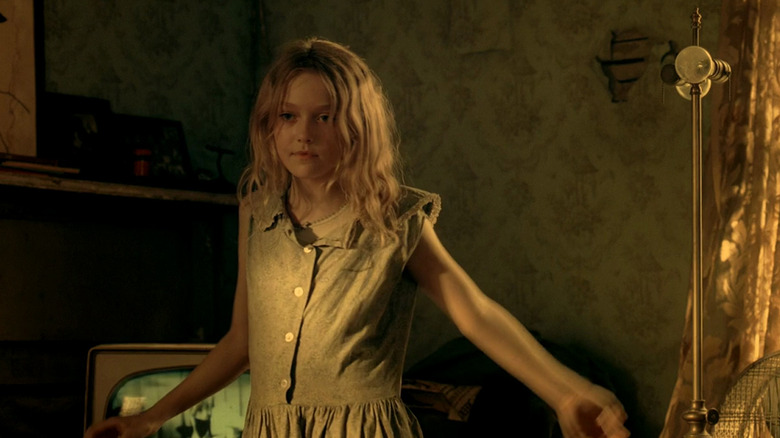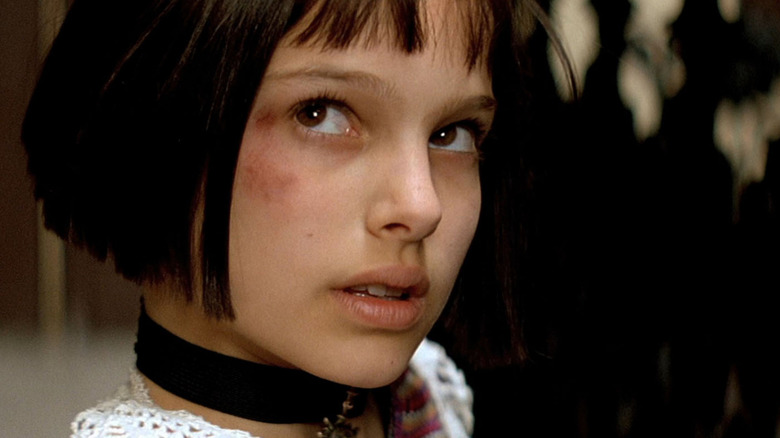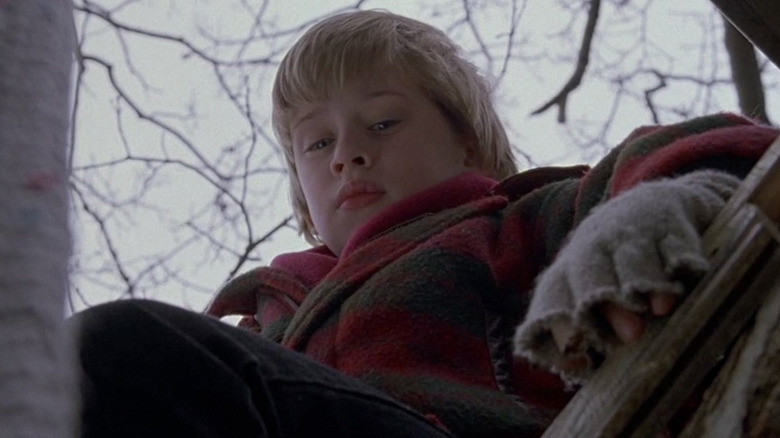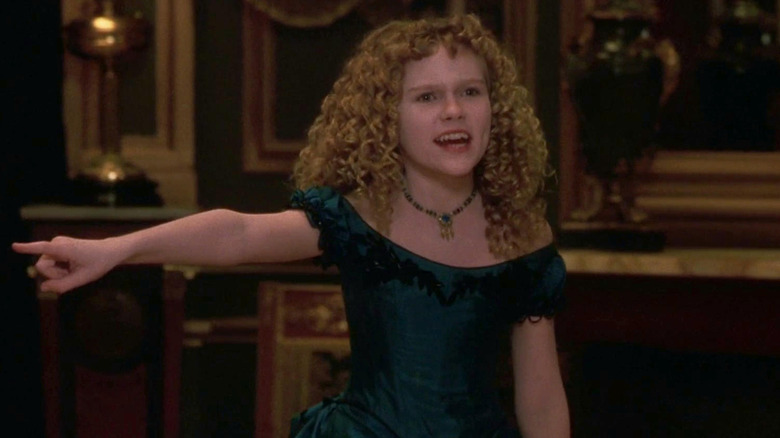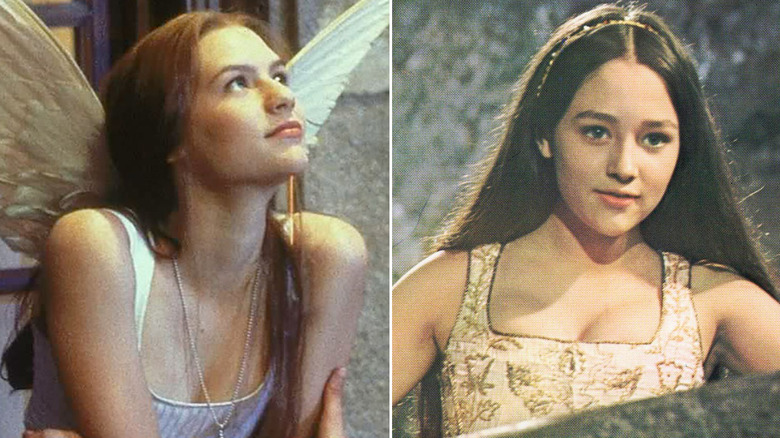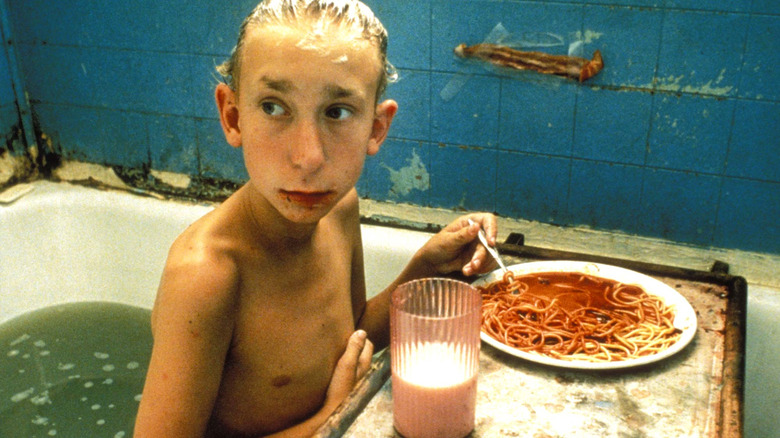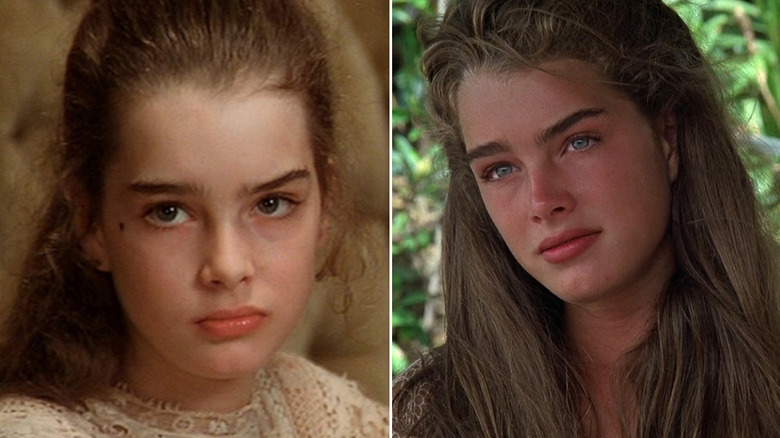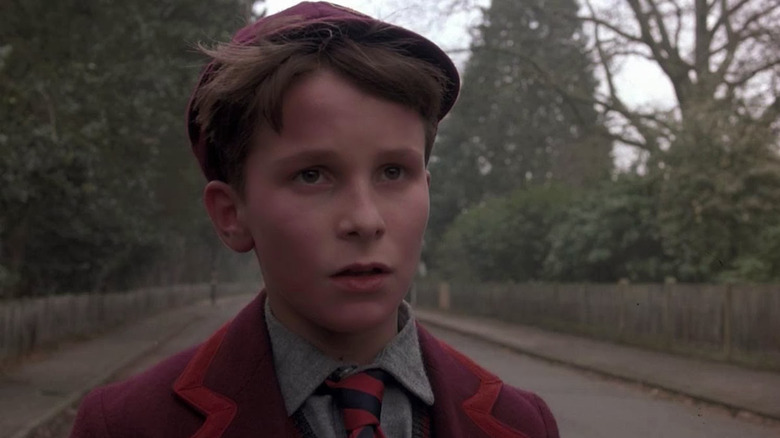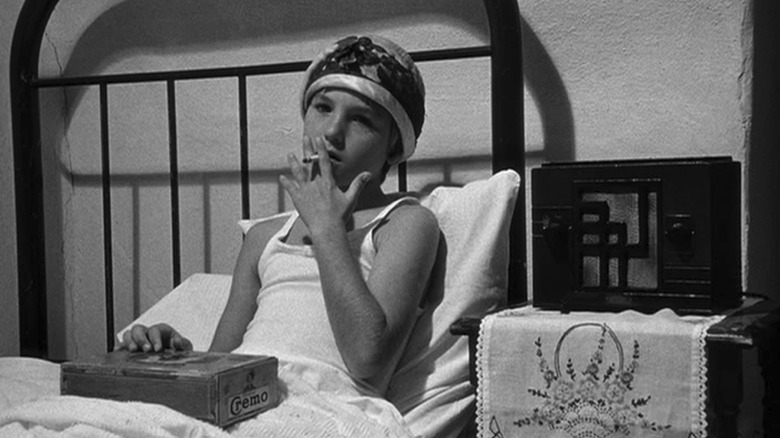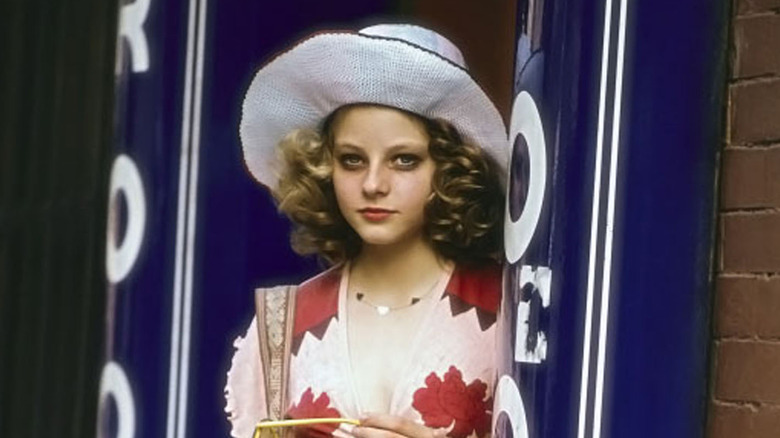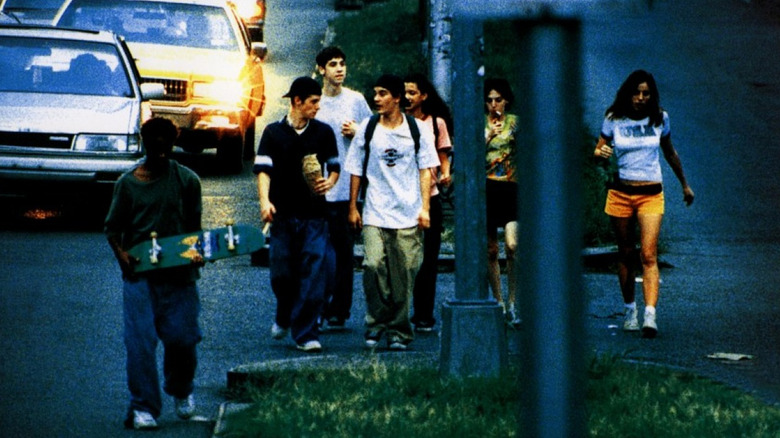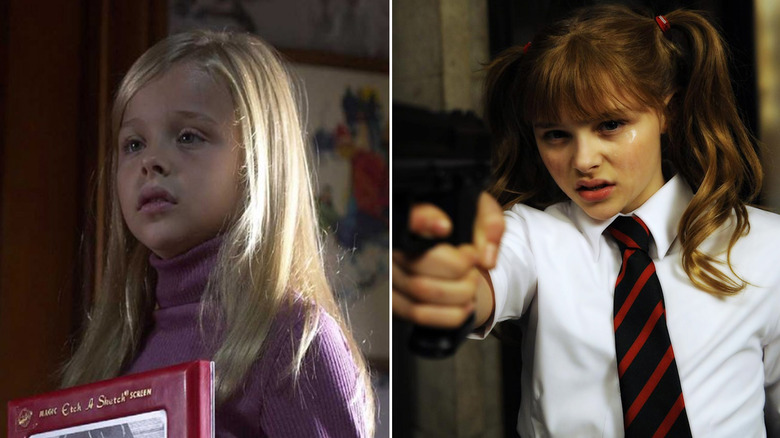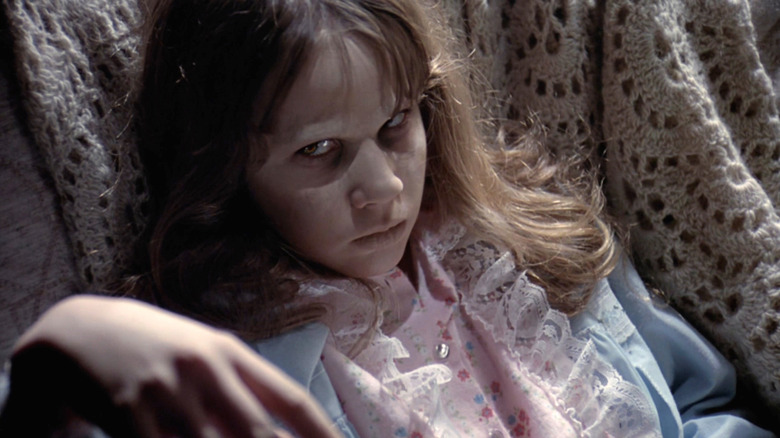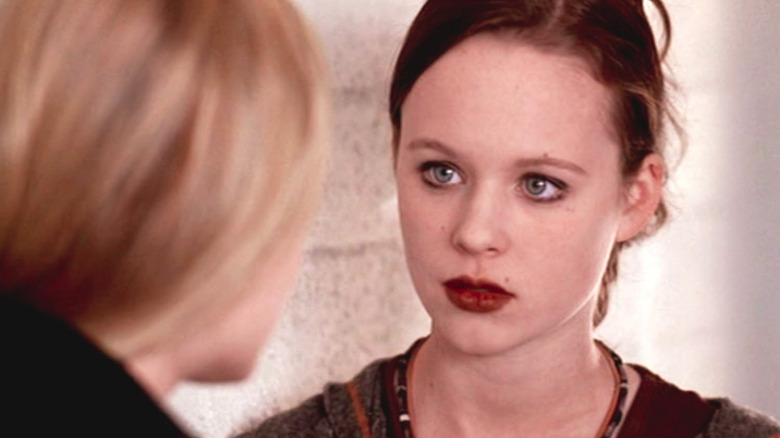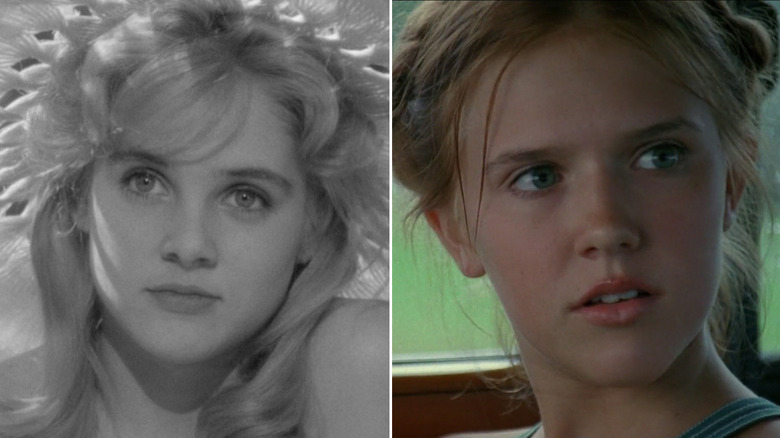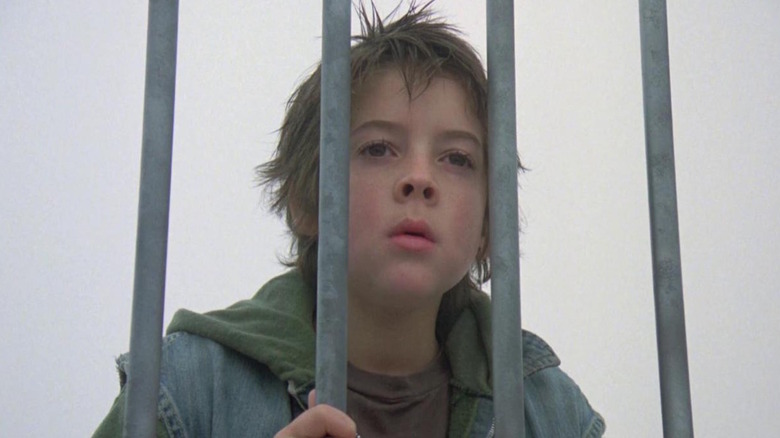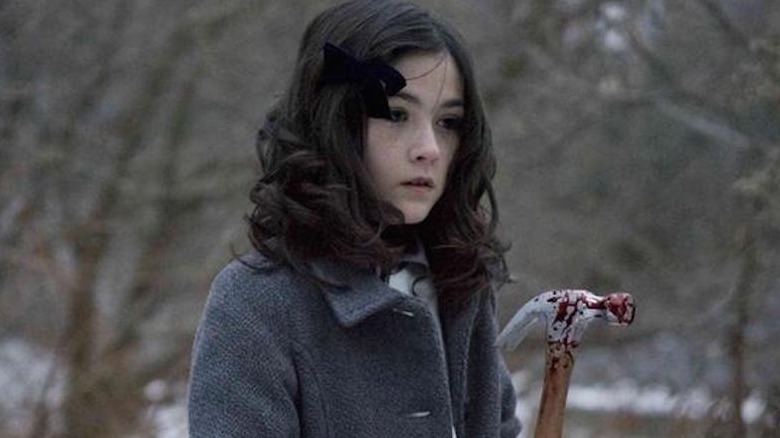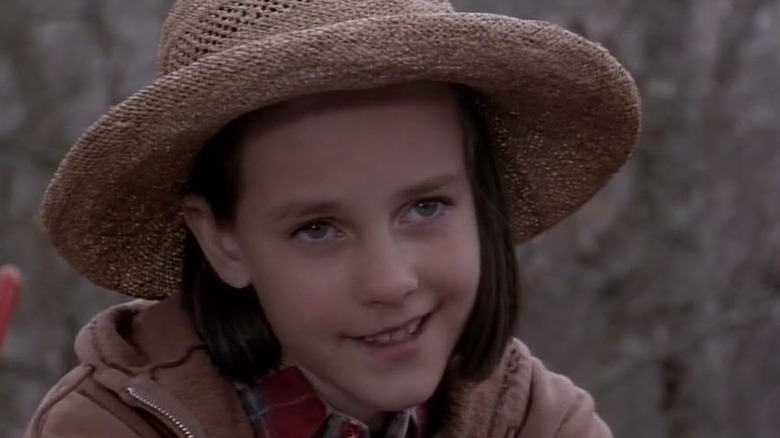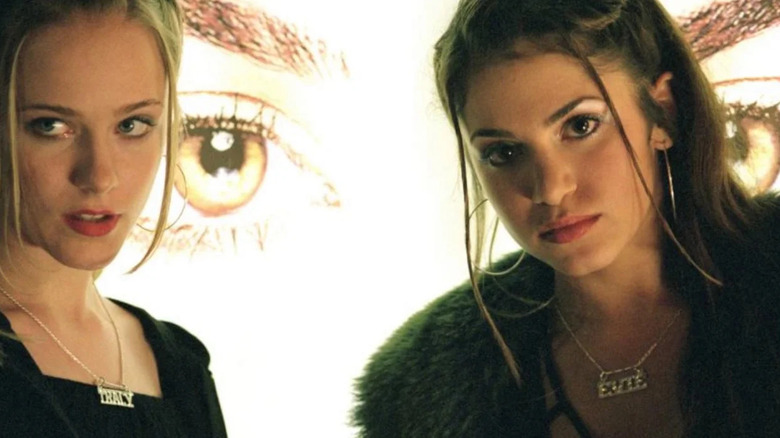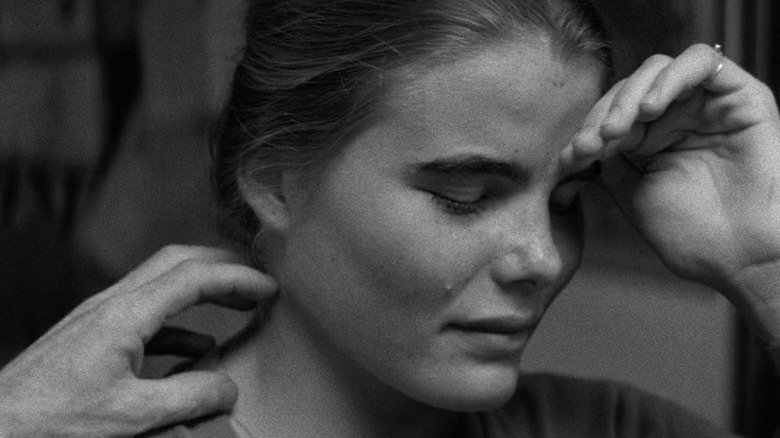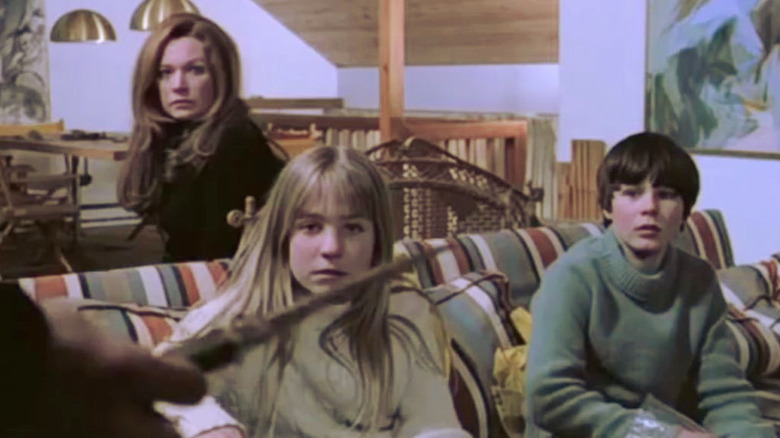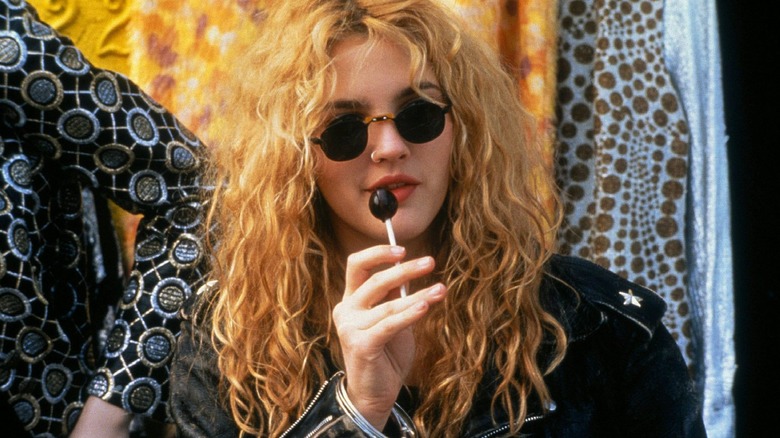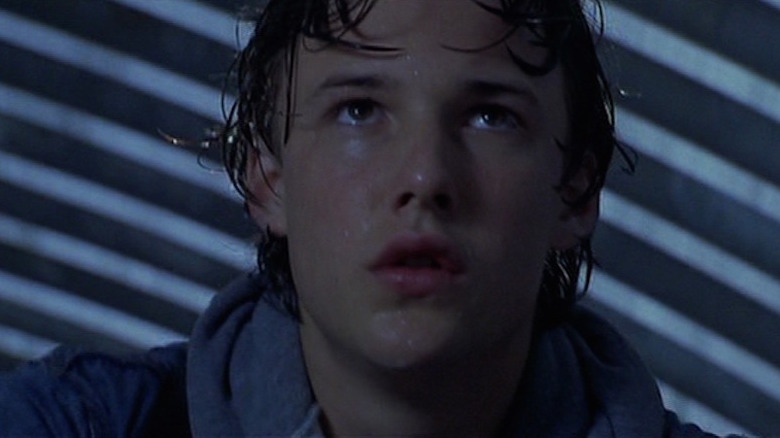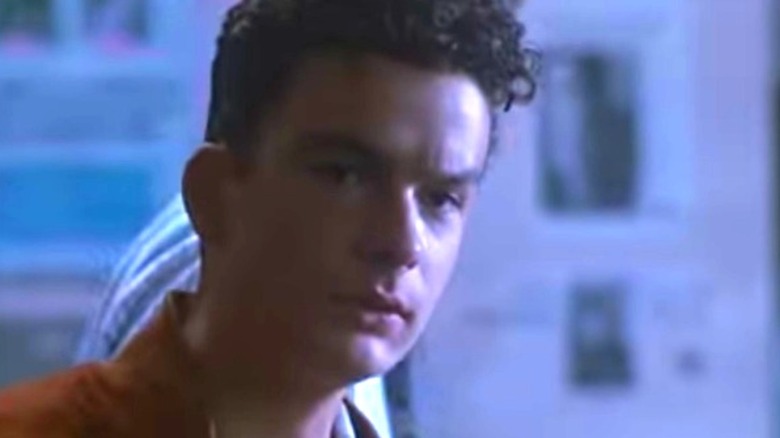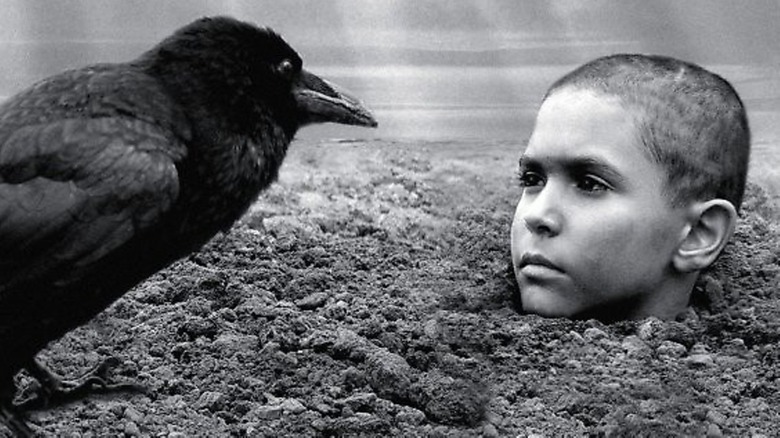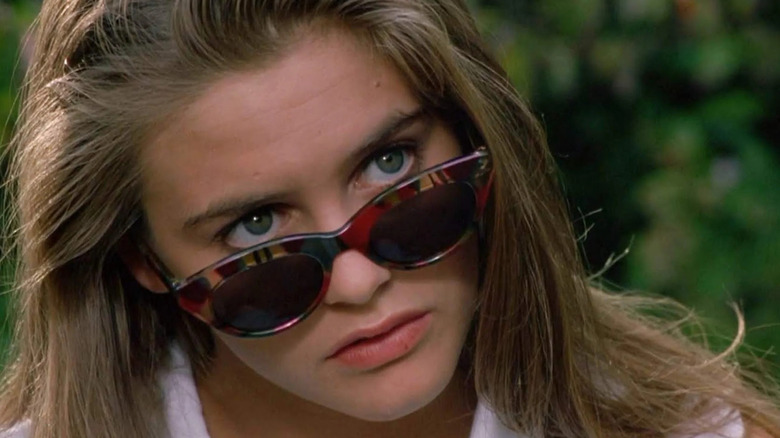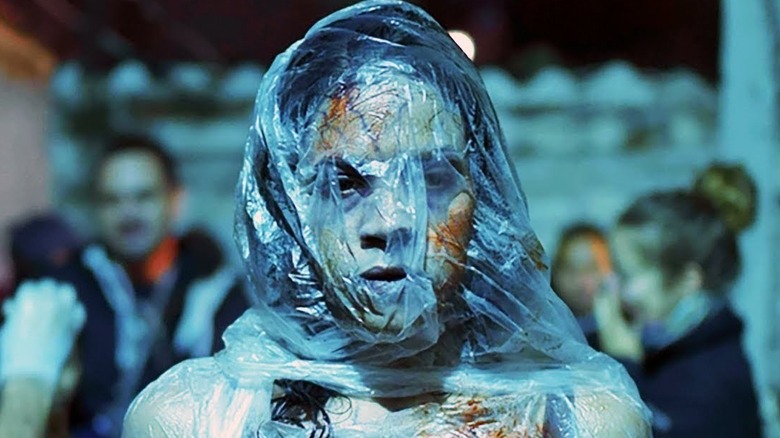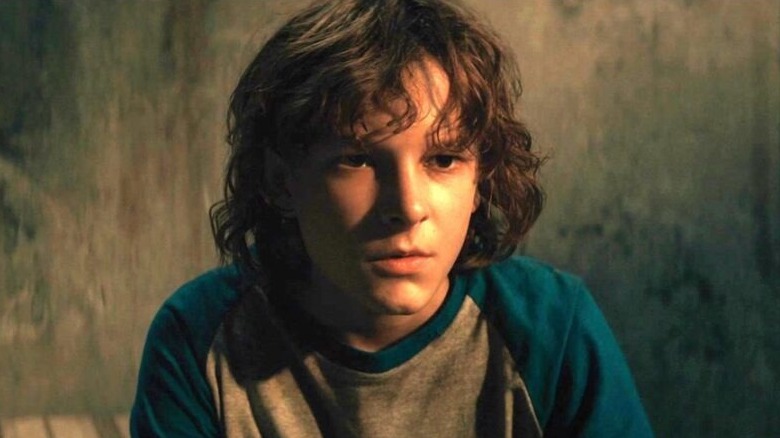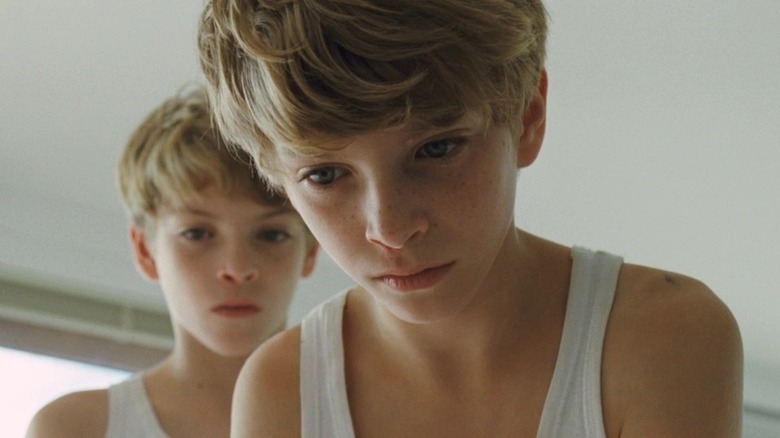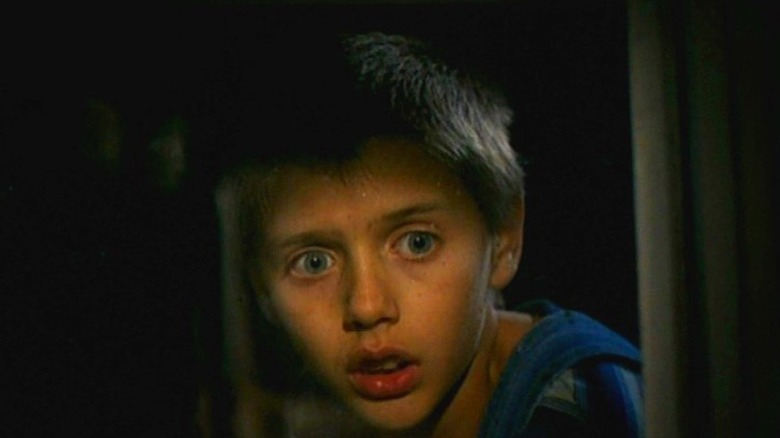Movie Roles That Were Too Mature For Child Actors
Being an actor isn't child's play—even for a child actor. Throughout Hollywood history, children have been called upon to act in mature, harrowing, sexual, or obscene situations, and over the years, some of these movies have sparked major controversies because of the ethical questions surrounding the practice of placing underage actors into disturbing scenarios. Let's take a look at some of the most famous examples of mature movie roles taken by underage actors.
Dakota Fanning (Hounddog)
In 2007, the coming-of-age drama Hounddog starring Dakota Fanning (I Am Sam, Man on Fire) made major waves upon its release—and not in a good way. The plot centers on Lewellen, an Elvis Presley-loving girl growing up in a very broken family, and the movie shocked critics and viewing audiences alike when it went further than typical tales of neglect and emotional abuse. In one scene, Fanning's character is raped by an acquaintance, sending her on a downward spiral of despair and illness.
Even though the scene contains no actual nudity and only the 12-year-old Fanning's face and hands are shown, the backlash was intense from viewers, critics, and activist groups. The film failed to find a wide release, and only earned $131,000 against its $3 million budget. Fanning herself responded to the criticism, dismissing the furor surrounding the scene. "It's a movie and it's called acting," she argued. "I wanted to do the film because I thought it might help one person that has happened to and help them overcome adversity in their lives."
Natalie Portman (Léon: The Professional, Beautiful Girls)
Natalie Portman made her big-screen debut in the 1993 thriller Léon: The Professional as 12-year-old Mathilda, whose situation goes from bad to worse when her abusive parents—and innocent little brother—are murdered by a corrupt DEA agent (Gary Oldman). She takes refuge with a neighbor (Jean Reno), who happens to be a hitman. Once she discovers Léon's occupation, Mathilda begs him to teach her everything he know, so that she can get her revenge. He reluctantly agrees, and the two enter into a strange mentorship that's tinged by an uneasy chemistry between the duo.
The love Mathilda has for Léon is arguably the least disturbing part of the movie; The Professional isn't Lolita with sniper rifles and hand grenades. Instead, watching the precocious Portman glibly smoke, practice killing, and even hold a gun to her own head is quite shocking when you realize the actress herself was only twelve when she filmed the part. This wouldn't be the last time Portman played a mature role, either—at just 15, she'd play a similar "old soul" when she co-starred in the ensemble film Beautiful Girls.
Macaulay Culkin (The Good Son)
While there have been plenty of "evil children" in thriller and horror films over the years, perhaps none are as evil as the role Macaulay Culkin played in 1993's The Good Son. There's no supernatural element driving his penchant for murder, he's just plain bad. When the good-hearted Mark (Elijah Wood) is sent to visit his extended family during winter vacation, things turn decidedly dark after he meets his cousin Henry (Culkin). It soon becomes evident that Henry is deeply troubled, and he begins to act out his psychopathic tendencies—causing a freeway pileup and later attempting to murder his little sister, his cousin Mark, and even his own mother.
It's hard to decide what's more disturbing—watching a 12-year-old try to kill everyone that crosses him, or trying to ignore that the same actor played the kind but mischievous Kevin in Home Alone. Because of this, The Good Son isn't particularly scary; you almost expect Henry to gleefully shout, "Come and get me!" when he runs off into the woods during the third act. Perhaps worst of all, the little sister Henry attempts to kill twice was played by Culkin's real-life sister Quinn, who was only eight when The Good Son was filmed. That experience must have made for some interesting family therapy sessions later.
Kirsten Dunst (Interview with the Vampire)
This list wouldn't be complete without Claudia from 1994's horror hit Interview with the Vampire. In Anne Rice's Vampire Chronicles books, the little girl was only five years old when she was turned into a vampire by Lestat. The producers obviously couldn't cast a real five-year-old in the violent role, so they cast Kirsten Dunst—who was only 11 when Interview was filmed.
Not only is the role disturbing because of the amount of anger, violence, and near insanity Dunst conveys, but also because Claudia completely embodies the idea of an "old soul." The child vampire is really an adult woman mentally, trapped for eternity in the body of a little girl. To her credit, Dunst really did an amazing job portraying this dichotomy, and all of Claudia's conflicting emotions that come with it.
Claire Danes/Olivia Hussey (Romeo & Juliet)
When the source material for your movie is a classic Shakespearean tale about star-crossed teenage lovers, you don't have much option but to cast actors young enough to convincingly play the part. In at least two famous film adaptations of the play, the directors chose to cast actual teenagers as the leading lady—leading to some raised eyebrows among viewing audiences when those actresses are then shown topless in bed or later committing suicide.
In the case of Franco Zeffirelli's 1968 adaptation, actress Olivia Hussey was only 15 when she was cast in the part of Juliet, and her Romeo (Leonard Whiting) was 17. In the modernized 1996 version Romeo + Juliet from director Baz Luhrmann, Juliet was played by Claire Danes, while the part of Romeo went to Leonardo DiCaprio. DiCaprio was 21 at the time, and the original casting of a 14-year-old Natalie Portman was nixed in favor of Danes, who was 16.
Jacob Reynolds (Gummo)
When it comes to disturbing scenarios and child actors, perhaps nothing can top the experimental 1997 dystopian art film Gummo, written and directed by Harmony Korine—also featured on this list for 1995's Kids. In Gummo, the broken lives of several residents of Xenia, Ohio are chronicled following the effects of a devastating tornado. Korine eschews traditional storytelling methods and instead presents audiences with an interconnected series of scenes that offer a glimpse into depravity, demoralization, and the depths of poverty.
Jacob Reynolds—who was 13 years old at the time of filming—plays Solomon, one of two fictional young Xenia residents featured in Gummo. He and his friend Tummler (Nick Sutton) pass the time with killing cats, huffing glue, paying for sex with a girl with Down's syndrome, and other disturbing hobbies. While most critics panned the film for its pervasive graphic content, Gummo was lauded by a few filmmakers, including famed director Werner Herzog—who particularly praised a bathtub scene (pictured above), which included an unexpected piece of bacon taped to the wall.
Brooke Shields (Pretty Baby, Blue Lagoon)
As a girl, actress Brooke Shields appeared in two different movies which placed her front-and-center in controversies about children and on-screen sexuality. At age 12, she starred in Pretty Baby, portraying Violet, a 12-year-old girl living with her mother in a New Orleans brothel at the turn of the 20th century. Eventually, Violet is plied into the prostitution trade as well, and her virginity is even auctioned off to the highest bidder. After Pretty Baby's release in 1978, the film—and Shields' nudity in it—was criticized by many, and the movie was even banned in two Canadian provinces.
Just two years later, Shields appeared in another heavily sexualized movie, The Blue Lagoon. At age 14, Shields portrayed a shipwrecked girl growing up on an island with only her cousin (Christopher Atkins) for company. As they reach puberty, they eventually fall in love and even have a child. The Blue Lagoon has several nude scenes involving Shields which raised eyebrows, but the cast and crew claimed most of those scenes involved body doubles.
Christian Bale (Empire of the Sun)
Long before his famous roles in American Psycho, The Machinist, or The Dark Knight trilogy, accomplished Method actor Christian Bale won critical acclaim at age 13, when he starred as Jim in the 1987 Steven Spielberg war film Empire of the Sun. The movie is essentially a coming-of-age drama set during Japan's occupation of China during World War II.
The subject material is difficult and brutally realistic, as we watch Jim go from a comfortable life with his family in Shanghai to a shattered existence, forced to grow up behind the barbed wire of a Japanese internment camp. Spielberg doesn't pull any punches with Empire of the Sun, and neither does Bale. Despite being just a child himself, Bale manages to deliver an emotional and commanding performance as a boy faced with the horrors of war.
Tatum O'Neal (Paper Moon)
While Tatum O'Neal's role as Addie in the 1973 comedy-drama Paper Moon is a lot more tame than some of the other entries on this list, it definitely had its moments. In the film, the 9-year-old O'Neal teams up with Mose, a con artist played by her real-life father, Ryan O'Neal. Throughout the pair's cross-country journey, we watch the absolutely tiny Tatum smoke, drink, and con people out of their money like an old pro. When Mose starts to neglect her in favor of an "exotic dancer" named Trixie (Madeline Kahn), a jealous Addie even devises her own con to get Trixie dumped.
O'Neal earned widespread acclaim for her work in Paper Moon, and even won an Academy Award for the part—making her the youngest competitive Oscar winner in history. The film was widely praised, and even spawned a short-lived television series, where the role of Addie was taken by another actress on our list: Jodie Foster.
Jodie Foster (Taxi Driver)
At just 12 years old and fresh off of her stint on the failed TV adaptation of Paper Moon, Jodie Foster stirred up quite a controversy when she appeared as the child prostitute Iris in Martin Scorsese's 1976 classic Taxi Driver. While not the central figure of the film, Iris still plays an important part when her path crosses with the troubled Travis Bickle (Robert De Niro). Iris attempts to escape her pimp by taking refuge in Bickle's cab; later, he tries to convince her to return home to Pittsburgh, and even offers her money to do so. In the climactic finale of the movie, Bickle kills her pimp and several others in a bloody shootout in order to "free" Iris.
Hiring a 12-year-old in such a role definitely raised alarms, but Scorsese took precautions—Foster was subjected to psychological testing before filming began, and her older sister Connie was used as a stand-in for sexually suggestive scenes. For her part in the film, Foster received an Academy Award nomination. Foster's Taxi Driver story wouldn't end there, however—she was later stalked by a fan who was obsessed with Foster and her role in the film. That stalker was none other than John Hinckley, Jr., who would later attempt to assassinate President Ronald Reagan in an effort to impress the actress.
The entire cast of Kids
Harmony Korine makes a second appearance on our list, this time as the writer of the 1995 coming-of-age film Kids, directed by Larry Clark. The film centers on the lives of several teenagers—and their sex lives—during the height of the AIDS epidemic. Like Korine's Gummo, Kids doesn't shy away from showing teenagers in some unbelievably disturbing situations. The teens—including one infected with HIV—are shown having unprotected sex, deflowering adolescent virgins, using drugs, and engaging in other risky behavior throughout the movie. In the final scene, a girl is raped after she passes out on a couch during a house party.
The casting included several real New York street kids who had no prior acting experience, including star Leo Fitzpatrick, who was only 16 during filming, and the rest of the primary cast was rounded out by more teenagers: Chloë Sevigny, Justin Pierce, and Harold Hunter were the oldest at 19, Jon Abrahams was 16, and Rosario Dawson was the youngest at only 15 years old. Naturally, the NC-17-rated Kids made waves when it premiered—with some critics praising the film and others deriding it as "virtually child pornography."
Chloë Grace Moretz (The Amityville Horror, Kick-Ass)
At just six years old, Chloë Grace Moretz started her acting career on a disturbing note when she made her big-screen debut in the 2005 remake of The Amityville Horror. In the film, she plays Chelsea, who befriends the ghost of a girl haunting their new home. Moretz later reported that her parents and the film's crew did their best to keep her from learning what the film was about, and she most definitely wasn't allowed to watch the movie when it premiered.
Just a few years later, Moretz would land the role she's perhaps best-known for: vigilante costumed superhero "Hit-Girl" in the 2010 movie Kick-Ass and its sequel, 2013's Kick-Ass 2. Compared to most little girls (and most superheroes), Hit-Girl is a hardened and nihilistic figure. Throughout the film, she kills with bloody and reckless abandon, and her dialogue is peppered with plenty of profane one-liners. Upon its release, Kick-Ass met with harsh criticism for the violence and swearing from groups around the world. It also received a well-deserved "R" rating from the MPAA, which meant that the 11-year-old Moretz was blocked from watching one of her own movies again.
Linda Blair (The Exorcist)
The same year Tatum O'Neal made her debut with Paper Moon, another child star was also making waves. In 1973, 13-year-old Linda Blair took to the screen as the demon-possessed Regan MacNeil in The Exorcist, a film filled with disturbing, disgusting, obscene, and vulgar sequences. Widely recognized as one of the most horrifying movies of the 20th century, it was also one of the more controversial, with famed critic Roger Ebert even suggesting it deserved an "X" rating instead of the "R" it was given by the MPAA.
For Blair, the impact of The Exorcist lasted long after the movie left theaters; she broke her back while filming the bed levitation scene, an injury that would later develop into scoliosis. Blair also reported that while rumors that the content of the film scarred her psychologically were untrue, The Exorcist did affect her—primarily due to all the unwanted (and often negative) attention she received from the press and the public following its release.
Thora Birch (American Beauty)
In the celebrated 1999 drama film American Beauty, Thora Birch plays Jane, the insecure daughter of main character Lester (Kevin Spacey). While much of the film focuses on Lester's obsession with Jane's cheerleader friend Angela (Mena Suvari), a major subplot involves Jane and her budding romance with next-door neighbor, Ricky. In one scene, Jane undresses in front of her bedroom window—knowing that Ricky is filming from his room next door. Because Birch was only 16 at the time American Beauty was filmed, this meant she had to get permission from her parents.
Sue Lyon/Dominique Swain (Lolita)
The character of Lolita from Vladimir Nabokov's classic novel is a prime example of a child placed into an extremely mature situation. In 1962, Stanley Kubrick adapted the novel into a movie, one which had a more symbolic take on Nabokov's controversial subject matter. Middle-aged Humbert Humbert (James Mason) becomes obsessed with Lolita (Sue Lyon), the adolescent daughter of his landlord. Actress Sue Lyon was only 14 at the start of filming, which was controversial in itself during the early '60s. Even though Kubrick had to largely ignore or skirt around the sexual content of Nabokov's novel—instead using innuendo to allow audiences to read between the lines—the movie still proved extremely controversial when it premiered.
More than 30 years later, Lolita was up for a remake—this time by director Adrian Lyne, with 15-year-old Dominique Swain in the title role. Even three decades later, Lolita was as controversial as ever, especially since Lyne's version stayed much closer to Nabokov's work. The movie had such problems finding an American distributor that it ended up premiering on Showtime's cable network instead, and critics in England even tried to get the film banned.
Joshua John Miller (River's Edge)
The first thing 12-year-old Tim does in "River's Edge" is throw his sister's doll into a river. It's a mean-spirited action, but it perfectly underscores the worldview of the small-town teens in Tim Hunter's 1986 film, whose alienation extends from theft and drug use to cold-blooded murder. Tim is the youngest of the film's characters but also the most casually amoral: by the end, Tim has threatened to kill his own brother, Matt (Keanu Reeves). "Why do you pull s**** like that?" Matt asks him, but no one — least of all Tim — has an answer.
Joshua John Miller – the son of playwright-slash-actor Jason Miller ("The Exorcist") — was just 12 years old when he replaced Corey Haim as Tim in "River's Edge," and with only a handful of innocuous TV credits to his name. But he's totally convincing in carrying out Tim's list of cruelties, which include stealing drug dealer Feck's (Dennis Hopper) gun and later assaulting him with it. Miller would play other kids on the edge — most notably in "Near Dark" — before transitioning to his current career as a writer and TV producer, but none were as chilling as Tim.
Isabelle Furhman (Orphan)
The catalog of cruelties perpetrated by Leena Klammer, a psychotic 33-year-old posing as an adolescent girl, isn't the most shocking element of 2009's "Orphan." Though Leena murders multiple people, threatens other children, and attempts to seduce her adoptive father, the really disturbing aspect of these incidents is that actress Isabelle Fuhrman was only 12 years old. But Fuhrman was more than happy to explore the gory aspects of her character. As she told the Boston Herald in 2009, "If America hates me, I've done my job."
Fuhrman doubled down on her astonishing performance in "Orphan: First Kill," a prequel released nine years after the previous film. Though 25 at the time, Fuhrman gave another chillingly believable turn as the 9-year-old Leena with the help of body doubles, forced perspective, and makeup special effects, but no CGI. "Sometimes I think the visual effects component of [digital effects] actually makes it look worse," director William Brent Bell told Showbiz Cheatsheet.
Jena Malone (Bastard Out of Carolina)
Oscar-winning actress Anjelica Huston made her directorial debut with a 1996 adaptation of Dorothy Allison's best-selling book "Bastard Out of Carolina," which concerns an abusive relationship between a young girl and her stepfather. Given the sensitive nature of the subject, most films opt for allusion or suggestions to depict such scenes. But "Bastard Out of Carolina" depicts physical and sexual abuse in graphic scenes featuring actress Jena Malone, who was 11 years old at the time.
"Bastard Out of Carolina" is handled with extreme sensitivity by Huston and her cast, but the content was strong enough for entertainment mogul Ted Turner to drop the film after agreeing to air it on TNT. The film eventually found its way to Showtime and earned numerous accolades, including Screen Actors Guild and Independent Spirit Award nominations for Malone. It also steered her career towards traumatized teens in TV movies like "Hidden in America" before her talent took her to more nuanced work in "Inherent Vice" and the "Hunger Games" films.
If you or anyone you know has been a victim of sexual assault, help is available. Visit the Rape, Abuse & Incest National Network website or contact RAINN's National Helpline at 1-800-656-HOPE (4673).
Evan Rachel Wood and Nikki Reed (Thirteen)
In "Thirteen," Tracy Freeland (Evan Rachel Wood) is already close to emotional ground zero when she enters the seventh grade. Her divorced mom, Melanie (Oscar winner Holly Hunter), is a recovering alcoholic, and her body image problems have led to self-harming. But when she meets popular girl Evie (co-writer Nikki Reed), her need for acceptance from someone — anyone — pushes her into rash acts, including shoplifting, drug use, and casual sex, that spiral into self-destructive behavior. Unfortunately, Tracy has only her fraught relationship with her mother as a support system.
Director Catherine Hardwicke and Reed, who later collaborated on the "Twilight" franchise, drew on Reed's own experiences as a tween when writing "Thirteen." Though Reed later admitted that she exaggerated some of her experiences in the script, the anxiety, confusion, and abandon of being a teen girl rings true in much of the film. Wood and Reed, who were 16 and 15, respectively, at the time of filming, were strictly monitored by Hardwicke, their own mothers, and a child welfare worker during their most difficult scenes, including a sexual sequence with Kip Pardue, to ensure their emotional well-being.
Mariel Hemingway (Manhattan)
In a 2015 interview with the late Anne Heche and Heather Duffy for their podcast "Better Together with Anne & Heather," actress Mariel Hemingway said audiences would never see her Oscar-nominated breakout role in Woody Allen's 1979 comedy "Manhattan" if the movie was released in the current film market. "I'm not condoning any behavior," said Hemingway (via Variety), "but that movie probably couldn't come out today." Why? Two strong reasons: One, the film features a romantic relationship between a 42-year-old writer (Allen) and Hemingway's 17-year-old student. While that scenario might have been offbeat and affectionate in 1979, today it reads as an older man's creepy manipulation of a young girl.
The other reason is the accusations by Allen's adoptive daughter, Dylan Farrow, who alleged that he sexually abused her when she was just 7 years old. It takes an athletic imagination to keep that out of mind while watching Allen canoodle with the very teenaged Hemingway. But even the most forgiving viewer must note that the cultural landscape has changed and that an adult with a teenager under 18 is inappropriate, no matter how funny the dialogue is.
If you or anyone you know has been a victim of sexual assault, help is available. Visit the Rape, Abuse & Incest National Network website or contact RAINN's National Helpline at 1-800-656-HOPE (4673).
David Elliott (The Possession of Joel Delaney)
The 1972 supernatural thriller "The Possession of Joel Delaney" was released right before the extremely popular "The Exorcist," yet failed to make a mark among horror or mainstream audiences. The film starred Oscar winner Shirley Maclaine as New York socialite Norah Benson, who believed that her brother, Joel (Perry King) was possessed by a dead psychopath who decapitated his victims. Director Waris Hussein took a low-key approach to the supernatural elements, save for one shocking scene.
Having failed to exorcise the killer's spirit with a Santeria ritual, Norah takes her children (David Elliott and Lisa Kohane) to her beachfront property, but Joel, now fully possessed, is waiting for them. He degrades the trio, forcing Kohane to eat dog food and making Elliott strip naked. The sequence is particularly chilling because the child actors are very young; Elliott, who appeared completely nude, was just 13. The scene, which would never fly in a horror movie today, drew critical condemnation, with Roger Ebert noting that "scenes of this nature are rotten and bankrupt."
Drew Barrymore (Poison Ivy)
Femme fatales have been a Hollywood trope since the days of silent pictures, but the stereotype takes an exploitative turn when the dangerous woman in question is a teenager. Most of the titles in the "teenage temptress" subgenre are trashy efforts designed for maximum titillation, but 1992's "Poison Ivy" aimed for a cross between film noir and "Fatal Attraction" in its story of a sexually free but homicidally inclined teen. The casting of Drew Barrymore — then in a career rebound after struggles with drug addiction — and name players like Sara Gilbert and Tom Skerritt attempted to lend respectability to the decidedly sleazy plot.
Barrymore, then 17, isn't particularly convincing at depicting Ivy, a deranged teen so taken with Gilbert's normal life that she's willing to seduce her father (Skerritt) and murder her mother (Cheryl Ladd) to get it. However, the character is a cartoon vixen, aware of her desirability but unable to use it for anything except base interests. Barrymore gamely handles the story's more prurient aspects, which include making out with the 17-year-old Gilbert and 60-year-old Skerritt and pushing Ladd off a balcony. Amazingly, "Poison Ivy" generated three more films, with Alyssa Milano, Jaime Pressley, and Danielle Brooks all echoing Ivy's murderous moves.
If you or anyone you know needs help with addiction issues, help is available. Visit the Substance Abuse and Mental Health Services Administration website or contact SAMHSA's National Helpline at 1-800-662-HELP (4357).
Brad Renfro (Apt Pupil)
Though the 1998 film adaptation of Stephen King's novella "Apt Pupil" differs from its source material — and was tainted by a lawsuit against director Bryan Singer for infliction of emotional distress and other charges — the film retains the story's disturbing portrait of evil's corrupting influence. The late Brad Renfro stars as Todd, a teenager who discovers that his elderly neighbor, Kurt Dussander (Ian McKellen), is a former Nazi and blackmails him into telling grisly stories from concentration camps. Their relationship warps both men in dangerous ways — Todd blackmails his guidance counselor (David Schwimmer), while Kurt turns to murdering transients.
Though some of the story's grislier elements are toned down for the movie, many are featured in Brandon Boyce's script. For Renfro, who was 17 years old during production, that meant participating in scenes where Todd helped kill a homeless man and a fantasy sequence in which he envisions his classmates as concentration camp prisoners going to the gas chamber (which triggered the aforementioned lawsuit). Todd's corrupted innocence was a character familiar to Renfro throughout his acting career in films like "The Client" and, tragically, in his own life off-camera, which ended with his death from a drug overdose at the age of 25 on January 15, 2008.
If you or anyone you know needs help with addiction issues, help is available. Visit the Substance Abuse and Mental Health Services Administration website or contact SAMHSA's National Helpline at 1-800-662-HELP (4357).
Balthazar Getty (Where the Day Takes You)
Actor Balthazar Getty was no stranger to playing mature roles at a young age. He made his film debut at 15 as an airplane crash survivor who descends into brutality in a 1990 film version of "Lord of the Flies." His role in the 1992 indie drama "Where the Day Takes You" carries more emotional challenges than physical ones: A survivor of childhood sexual abuse at the hands of a relative, Getty's Little J survives on the streets as a prostitute, tormented at having to repeat his own trauma in order to survive.
Getty, who was 17 years old while making "Where the Day Takes You," navigates Little J's descent into deeper turmoil with exceptional focus and strength. Desperate to belong to a family of fellow teen runaways, he becomes involved in a power struggle between the group's leader, King (Dermot Mulroney), and the psychotic Tommy Ray (Peter Dobson). Little J eventually kills Tommy Ray, leading him to desperately seek shelter with a client (Stephen Tobolowsky). But he's rejected again and ends up in a shootout with police that leads to his arrest.
If you or someone you know may be the victim of child abuse, please contact the Childhelp National Child Abuse Hotline at 1-800-4-A-Child (1-800-422-4453) or contact their live chat services.
Petr Kotlar (The Painted Bird)
Petr Kotlar was just 11 years old when he was cast in Czech director Vaclav Marhoul's 2019 adaptation of Jerzy Kosinski's novel of the same name. He couldn't have picked a more harrowing story for his debut; the movie follows a mostly silent boy wandering through a surreal hellscape in Eastern Europe during the early days of World War II. The boy is brutalized — beaten, sexually assaulted, and tortured — and witnesses horrific behavior by every adult he meets. Kotlar had never acted on film before but holds his own in scenes opposite Stellan Skarsgaard, Harvey Keitel, and the late Julian Sands.
In an interview with The Guardian, Marhoul said he shielded Kotlar from the most traumatizing scenes by capturing his reactions separately from the action. He also relied on Kotlar's family and a full-time assistant to provide him with emotional support when it was needed. Despite the protection, the experience may have impacted Kotlar differently. "After, he told me he doesn't want to be an actor," said Marhoul.
If you or someone you know may be the victim of child abuse, please contact the Childhelp National Child Abuse Hotline at 1-800-4-A-Child (1-800-422-4453) or contact their live chat services.
Alicia Silverstone (The Crush)
Alicia Silverstone made her screen debut in "The Crush," a supremely icky thriller that cast the 17-year-old actress as a 14-year-old lethal Lolita with designs on 20-something journalist Cary Elwes. The film, by TV vet Alan Shapiro, plays on familiar sexist tropes about teenage girls and the clueless adult men who fall for them. Elwes' character steps into every snare laid by Silverstone and then experiences a moment of crisis about her age, which is supposed to generate sympathy when she unleashes a torrent of psychotic behavior on him.
"The Crush" portrays Silverstone as a contemptible object while also fetishizing her adult-grade sexuality. As the film's villain, she's given all sorts of outlandish schemes to carry out: she nearly kills Elwes' new girlfriend (Jennifer Rubin) and pins a charge of sexual assault on him. At the same time, the film also affirms that it's okay to enjoy the camera ogling a 14-year-old at every turn. The Washington Post's review summed up the film's have-it-both-ways approach by noting, "There's something scuzzy about the whole exercise."
The cast of Tigers Are Not Afraid
Guillermo del Toro is a passionate advocate of writer-slash-director Issa Lopez's 2017 Mexican film "Tigers Are Not Afraid," which is both a haunting supernatural thriller and a melancholy look at the impact of drug violence. But as with del Toro's films like "The Devil's Backbone" and "Pan's Labyrinth," "Tigers Are Not Afraid" is also about the terrors and traumas of childhood and how some children learn to survive them while others do not. To deliver that gut punch, Lopez worked with an extraordinary group of young actors and put them through an emotional workout, albeit one carefully guided by her and an acting coach.
The young actors in "Tigers Are Not Afraid" play residents of an unnamed Mexican city ravaged by drug lords. The children lose virtually everything — parents, homes, even mementos — and death is around them at all times. Bodies lie in the streets, adults and children are killed violently in front of them, and children are forced to fight and even kill in return. Ghosts are also a constant presence, urging revenge for their murders. The film's world is terrifying and made even more so because it leaves children alone to face it.
Mason Thames (The Black Phone)
Scott Derrickson's thriller "The Black Phone" is so briskly paced and tightly constructed that viewers might almost miss the storyline's truly horrible elements. An adaptation of a short story by Joe Hill, "Black Phone" concerns Finney (Mason Thames), a teenager who has been abducted by a child murderer known as The Grabber (Ethan Hawke). Though terrified, Finney begins to receive visions and messages — often through the disconnected titular object — from The Grabber's deceased victims and formulates an escape plan.
Finney's communication with the other children is also so otherworldly that it's almost easy to forget these kids have died in particularly tragic ways. They were stolen off the streets of their own hometowns and tormented by a sadistic masked killer who eventually took their lives in a way that undoubtedly "really hurt," as The Grabber says. The unendurable sadness of Finney's fate and their deaths is felt in the emotional line readings by Thames (who was 14 when the film was released in 2021) and his young cast mates. Dying a terrible, lonely death is a nightmarish situation to consider, but they prove more than capable of shouldering it.
Elias and Lukas Schwarz (Goodnight Mommy)
In 2015's "Goodnight Mommy," a woman returns to her isolated home after surgery, where her twin sons greet her. At least, they believe she's their mother, but her angry, often violent reactions to them cause the boys to suspect otherwise. They hold her captive in increasingly cruel ways in order to extract a confession from her, but what they eventually discover is far more complicated and chilling than any imposter situation.
Adding considerably to the creepiness of this Austrian film by directors Severin Fiala and Veronika Franz is that two young boys play the twins. Elias and Lukas Schwarz, who, according to various sources, were 12 while filming, carry out many unsettling things in the film; they raise huge cockroaches and dote on a dead cat, and eventually tie down and seal their alleged mother's mouth shut to prevent her from screaming for help. When she refuses to change her story, the boys glue her to the floor and set the house ablaze, but by that point, it's far too late for anyone to change their story.
Stefan Clapczynski (Funny Games — 1997)
Michael Haneke's 1997 film "Funny Games" is a polarizing experience. You're either wowed by the movie's deliberate manipulation of its story to produce maximum horror or completely disgusted by its catalog of sadism. The brutality visited by two strangers upon an Austrian family is painful to watch — husband Georg's leg is broken, wife Anna is forced to find her dog after it's been murdered — and the torment seems to have no point beyond amusing the culprits.
The couple's son, Schorshie, suffers some of the worst abuse. Not only does he witness his parents' torture, but he also stumbles upon the corpse of his neighbors' daughter in an attempt to flee. Schorshie — played by German actor Stefan Clapczynski, then just 11 — is also featured in one of the film's most infamous scenes, when he's mercilessly (and apparently accidentally) shot by one of the strangers. The on-screen death of a child is upsetting for audiences (and undoubtedly for young actors, too), but when accompanied by so much other awful behavior, it's an almost unbearable experience.
